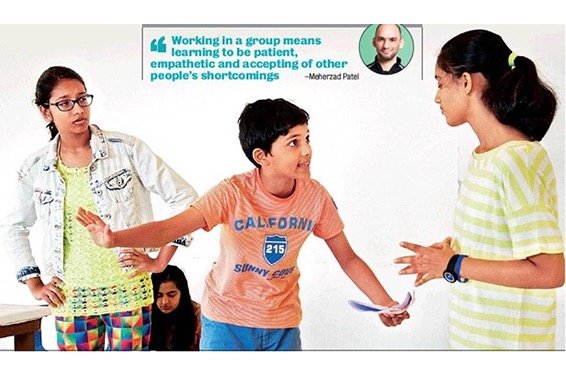Life skills you learn from drama
Theatre director Meherzad Patel gives an insight into stage exercises that teach children empathy and self-sufficiency
Working in a group means learning to be patient, empathetic and accepting of other people’s shortcomings –Meherzad Patel
It’s strictly a “no-tree, no-flower policy” for writer-director Meherzad Patel. “If you recall, as kids growing up in the 90s, we had all been subjected to being trees and flowers in school plays, without any dialogues to deliver on stage. The good actors got better and the rest got worse. I make sure children at my workshop don’t go through the same experience,” says the 30-year-old, who’s conducting a 10-day summer workshop at the National Centre for the Performing Arts, for 12 to 18-year-olds, this May. “Children just want to have fun, and parents want their kids to be best at everything. Neither is wrong in their approach or requirement. So we cater to both,” he shares.
Through his workshop, the S.P.I.T Theory, Patel hopes to find the actor in every person. “A good actor isn’t one with talent; it is one who follows the guidelines given by us in our workshops. Disciplined actors can be taught,” says the man behind the theatre group Silly Point Productions, which has produced plays such as The Devil Wears Bata, Laughter Therapy and The Buckingham Secret. Patel will be conducting the workshop along with team members Danesh Khambata, Sajeel Parakh, and Danesh Irani. “We hope to convert the weakness of every child into their strength and make them a best version of themselves at that — to be original, and to build self-confidence,” he says. This can be achieved with the following theatre exercises.
Use the EEE principle
Patel relies on the basic EEE principle — energy, eye contact and enunciation.
“Energy is that spunk inside you — that power and stamina to enthusiastically apply yourself on stage and make the audience believe in your character. Most kids and adults don’t know how to make proper eye contact because they are constantly staring at their screens and phones. Eye contact captivates an audience member and makes your poem or dialogue sound genuine. In daily conversations too, we must make eye contact,” he says. “Enunciation is the vocal equivalent of a spell-check in a written article. Every letter must be heard clearly as you speak. We break down the 26 letters of the English alphabet into groups based on the sound or structure of the letter. For example, bite your ‘V’ and ‘F’; pucker up your lips on ‘B M P’. Once the eye contact is established, it automatically provides the confidence to speak in front of a crowd.”
Play energy games
In Patel’s workshop, the children play a simple game, ‘zip zap zoom’, where you pass along an imaginary ball full of energy. “And as you pass it, the next person pulls the energy from you, as you do from the person before you, and so on. This exercise teaches you how to be alert and quick. Most importantly, among strangers, it breaks the ice, facilitating a more fun environment,” he says.
Practise trust exercise
Building trust is a key factor in building confidence. Even in a work environment, employees are able to see a boss’s vision only when there is trust. This simple exercise, according to Patel, helps you achieve that.
“One person stands on the chair; one holds it and the third person catches the person falling off the chair. Most people cannot even look down on Day One; by Day 10, they gradually trust the person to catch them and fall freely,” says Patel. “This teaches you to trust your partner and get rid of those butterflies in your tummy.”
Perform a tale in a minute
How and why would one perform the story of Cinderella and her wicked sisters in a minute? “By doing this, the kids learn to edit and focus on the important points of the story, and teamwork, over everything else,” says Patel.
Mime a gift box
Here, students take out anything they want from an imaginary box. The focus is on the details — how you remove the item, the size of the box, the attention to detail in your prop. “The endgame is convincing the audience that you are actually using that item without it really being there,” says Patel. “It happened on stage to me once. The phone rang, but there was no instrument. So I picked up the duster of the blackboard, turned my face away from the audience and spoke into the duster as though it was a phone. The audience never suspected a thing.” Imagination and creativity are future business skills you need for problem solving and arriving at simple solutions.
Recite in a group
In this exercise, children take a poem and learn how to recite it together in character with different voices and sound effects. “This teaches you not only how to learn a poem effectively with different character sounds, but also how to work in a group,” says Patel. “Working in a group means learning to be patient, empathetic and accepting of other people’s shortcomings.”





